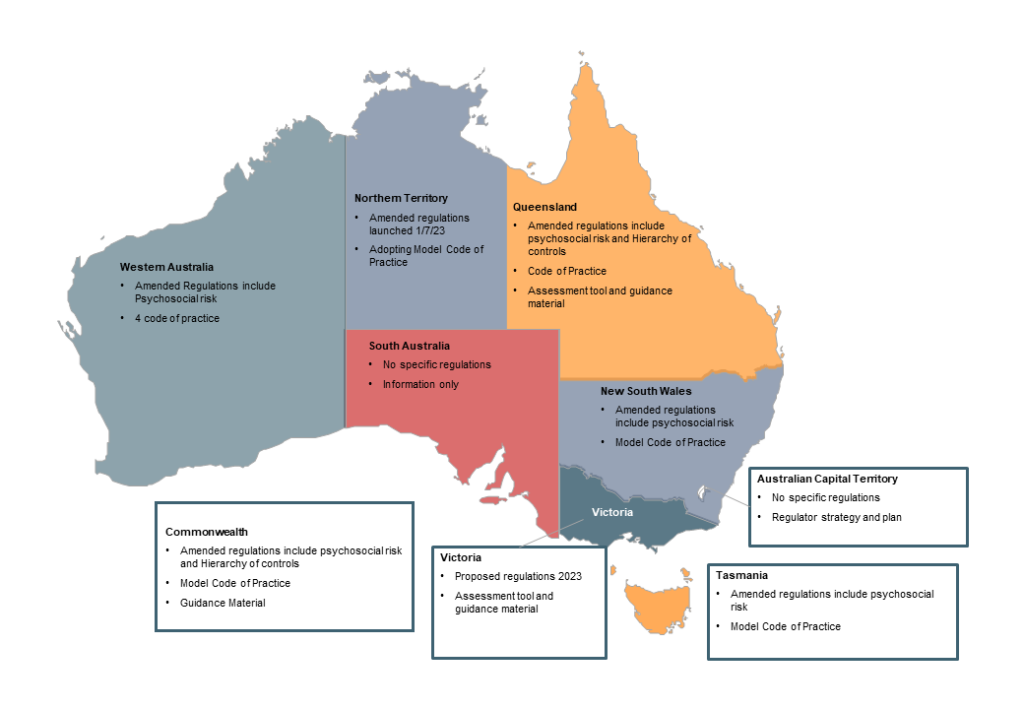Navigating Psychosocial Risk Legislation in Australia

In recent years, the awareness of workplace mental health’s importance has grown significantly in Australia. Business and government leaders are acknowledging the benefits of a psychologically healthy and safe workplace, leading to an increased focus on workplace mental health policies and regulations. As a result, legislation and regulations addressing psychosocial risks in Australian workplaces have been evolving. In this overview, we’ll explore the current state of psychosocial risk legislation in Australia and how it impacts businesses and employers.
National Policy & Regulatory Agenda
Australia is experiencing a shift in the policy and regulatory landscape concerning workplace mental health. Safe Work Australia (SWA) and state-based work safe regulators are gaining more influence and power in promoting psychosocial risk management in workplaces. Notably, reports like the Productivity Commission’s inquiry into Mental Health and Victoria’s Royal Commission inquiry into Mental Health have endorsed the need for a comprehensive approach to mental health in non-clinical settings, including workplaces.
National and State Workplace Regulations
Several states and territories in Australia have implemented or are planning to introduce new regulations and codes of practice addressing psychosocial risks in the workplace. These regulations place responsibilities on Person Conducting a Business or Undertaking (PCBU) to eliminate or minimize psychosocial hazards to the extent reasonably practicable. The aim is to bring psychosocial hazards on par with other significant workplace hazards, such as falls or operating machinery.

Overview of some of the state-specific actions
1. New South Wales (NSW): NSW adopted explicit requirements for PCBUs to manage psychosocial risks in the workplace from October 1, 2022, aligning with the national model regulations.
2. Tasmania: Tasmania adopted the model WHS regulations on psychosocial risk from January 4, 2023.
3. Western Australia (WA): WA adopted the model WHS regulations on psychosocial risk in December 2022, and the Work Health and Safety Commission has developed codes of practice focusing on psychosocial hazards in different industries.
4. Queensland: The state has moved to align with the national WHS model regulations on psychosocial risk and introduced the Work Health and Safety (Psychosocial Risks) Amendment Regulation 2022. The Managing the Risk of Psychosocial Hazards at Work Code of Practice 2022 came into effect on April 1, 2023.
5. Victoria: The Victorian Government is currently considering options for the development of the Occupational Health and Safety (Psychological Health) Regulations (proposed regulations) to better prevent workplace psychological hazards and injuries.
6. Northern Territory: Adoption of amendments to the model WHS regulations on psychosocial risk commenced on 1 July 2023.
7. Australian Capital Territory (ACT) and South Australia: ACT has committed to managing work-related psychosocial hazards, while SA’s adoption of the model WHS regulations on psychosocial risk remains uncertain.
8. Commonwealth: The Commonwealth has amended work health and safety laws to include regulations on managing psychosocial risks and hazards at work from April 1, 2023.
Australia is witnessing a significant shift in the approach to workplace mental health, with psychosocial risk legislation gaining prominence. Employers and businesses that are aware of these evolving regulations can adapt their practices to ensure compliance and foster psychologically healthy and safe workplaces. By proactively managing psychosocial risks, employers can create a positive work environment and contribute to increased productivity and employee wellbeing.

